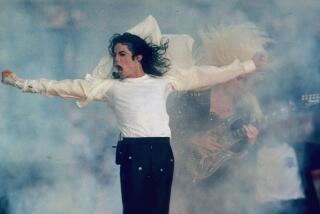Format shift in Jackson sales
- Share via
In the first few days after Michael Jackson’s death on June 25, bereaved fans downloaded nearly 2.5 million digital copies of his songs, setting a record that’s likely to stand for years. Before that, no music act had ever rung up even 1 million digital tracks in a single week.
Just as when John Lennon was killed in 1980, or when Elvis Presley died three years earlier, those who rushed out to music stores looking to buy physical copies of Jackson’s albums often found that stock disappeared quickly under the huge demand born of tragedy.
The difference this time was that the era of the digital download gave Jackson’s followers instant access to virtually anything in his catalog.
“Unlike in the past when the marketplace would be out of stock, the digital part of the business gave a connection for the content that fans were looking for immediately,” said Gary Arnold, senior entertainment officer for Best Buy.
Last week, the pendulum swung back the other way. Once online and brick and mortar retail outlets replenished their shelves, an additional 800,000 copies of Jackson’s albums were sold in the first full week after his death, according to figures released last week. CDs and other physical media accounted for 82% of those sales at a time when the demise of the CD is estimated to be only a few years away.
Officials at Jackson’s label, Sony Music-owned Epic Records, declined to be interviewed for this story, as they’ve declined all interviews about Jackson’s catalog since his death; likewise, neither iTunes nor Amazon would comment on sales-related information.
The latest figures from Nielsen SoundScan show that so far this year, overall music sales have been split 60% in favor of physical media and 40% digital. That’s a rapid shift since 2005, when 92% of all music sales were physical and just 8% digital. SoundScan predicts that digital music will account for half of all music sales by the end of next year if current trends hold.
Fan response to Jackson’s death has illuminated the distinct needs that physical and digital formats serve. The immediacy and near-universal accessibility of digital music has made it the form of choice for millions today. But physical media still offer an emotional connection that digital music has yet to replace.
Jackson’s life and career were unique on so many fronts that most resist drawing generalizations based on what’s happened since he died. But coupled with a surge in demand for vinyl LPs in recent years, there are those who see it as a reflection of a broader theme about how fans bond with their favorite music and musicians.
“I think because Michael Jackson’s music meant so much to so many people of different generations, that emotional aspect of it created a situation that we saw where people wanted to come into a music store and get something they could hold in their hand as opposed to something to load into their computer,” said Dave Cunningham, a floor manager at Amoeba Music in Hollywood.
Beyond looking for a form of music that’s tangible, Cunningham said many of the store’s customers also were looking for a sense of community they don’t find buying music online.
“They were talking with other customers about what they felt,” he said. “That’s one of the things we try to do overall, foster that environment of the record store . . . People are hungry for that kind of thing -- not just the physical product that you can hold in your hand, but the experience of going to the record store. That sort of got lost in the late ‘90s and the early millennium with the introduction of download culture.”
There’s also a generational aspect at work.
“With Michael, his music probably resonates strongest with people who are 30 and above and who remember physical product fondly,” said Keith Caulfield, senior chart manager for Billboard. “If we were talking about Lady Gaga or Katy Perry, I don’t think there would be a run on physical product.”
Caulfield noted that the album format still skews more strongly toward physical media than do singles. In the first half of 2009, digital album sales overall have averaged 21.5%, compared with 78.5% for physical product, Caulfield said.
The recent increase in physical sales of Michael Jackson albums is noticeable, yet not so dramatic that anyone is casting it as a sign of revitalization of the physical side of the record business.
“I think that the death of the CD as it’s been called is further out than most would expect,” Arnold said. “My belief is that more of a generational transition may occur than a transition driven by a specific device or opportunity.
“It’s going to take some more time before we can make any concrete evaluation of what this means,” he continued. “But I think in the wake of tragedy as people gravitated to the music, probably there were people who wanted physical forms of the content, but we can’t overlook the fact when the moment arose, digital was there to help.”
--
More to Read
The biggest entertainment stories
Get our big stories about Hollywood, film, television, music, arts, culture and more right in your inbox as soon as they publish.
You may occasionally receive promotional content from the Los Angeles Times.










